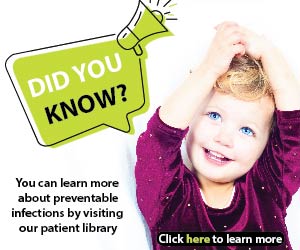Healthcare Professionals – e-Learning
Browse a selection of educational resources and online continuing medical education credits (CMEs) regarding vaccination. Select a category below to view available broadcasts, training modules and webinar titles. Note that these courses are designated to healthcare professionals only.
Titles are listed by category:
Influenza
Flu Refresher Course
This training module is intended as a refresher on how to administer the flu vaccine. The module can be completed within 30 minutes.
The iMD Patient Engagement Platform is a web-based patient education platform that is available on any device with internet. iMD Health enables healthcare providers to bring their patient sessions to life through the seamless integration of professionally-vetted diagrams, educational resources, brochures and videos covering over 1,800 medical conditions, procedures and treatment options.
To get your account, visit app.imdhealth.com/signup.
The Power of VAX: Enhancing vaccination with a quick and evidence-based approach
Discover how simple 30-second conversations can protect patients while strengthening your professional relationships. Get up to date on the latest NACI recommendations and vaccine data in a format that respects your time. Transform routine interactions into life-saving opportunities with this game-changing approach to pharmacy-based vaccination.
Learning Objectives
After completion of the webinar participants will be better able to:
- Implement the AIMS approach and presumptive offer technique to increase patient vaccine acceptance during routine pharmacy interactions.
- Identify and proactively engage high-risk patients requiring vaccination and integrate screening into existing workflows without disrupting operations.
- Apply current NACI recommendations for COVID-19 and influenza vaccination, including safe co-administration protocols, to ensure optimal patient protection.
- Evaluate patient vaccine concerns and demonstrate evidence-based and empathetic communication strategies.
- Determine the steps to coordinate the entire pharmacy team to maximize vaccination opportunities and improve community health outcomes among vulnerable populations.
If you are a Pharmacist, visit RxBriefCase to register.
Right Vaccine, Right Patient: Using the Influenza Decision-Making Tool in Practice
This 5-minute microlearning provides clinicians with a quick, intuitive walk-through of the Influenza Decision-Making Tool, demonstrating how to identify the right vaccine for the right patient at the point of care, especially for older adults and high-risk groups.
Learning Objectives:
After viewing this microlearning, participants will be better able to:
Apply the influenza vaccine decision algorithm to match product selection with patient age and risk profileDifferentiate between standard-dose, high-dose, and adjuvanted influenza vaccines based on NACI preferential recommendations and level of evidence
If you are a Physician/Nurse/Specialist, visit MDBriefCase to register.
If you are a Pharmacist, visit RxBriefCase to register.
Improving Influenza Vaccine Uptake in Adults 65+: A Practical Communication Approach
This brief video highlights how using presumptive language during clinical encounters can increase influenza vaccine uptake among adults 65 years and older. The program reviews the elevated risks older adults face from influenza, the evidence supporting high-dose influenza vaccines, and practical examples of confident, tailored communication that reinforces vaccination as a routine and expected part of care.
Learning Objectives:
After viewing this microlearning, participants will be better able to:
- Use presumptive communication to frame influenza vaccination as the routine and expected next step for adults 65 years and older.
- Tailor vaccine recommendations, including the high-dose influenza vaccine, based on individual patient risk factors and misconceptions to support informed and confident decision making.
If you are a Physician/Nurse/Specialist, visit MDBriefCase to register.
If you are a Pharmacist, visit RxBriefCase to register.
Optimizing Flu Season: EMR Prompts, Intake Workflows, and Triage for Adults 65 plus
This brief video outlines practical system-based strategies, such as EMR alerts, screening workflows, and inventory planning to increase influenza vaccination uptake in adults ≥65 and ensure high-risk patients receive enhanced vaccines when available.
Learning Objectives:
After viewing this microlearning, participants will be better able to:
- Implement EMR alerts, standardized screening processes, and clinic or pharmacy workflows that support proactive and routine influenza vaccination for adults ≥65 years.
- Apply evidence-informed triage strategies during periods of limited enhanced vaccine supply to ensure that high-risk older adults are prioritized for high-dose, adjuvanted, or recombinant influenza vaccines.
If you are a Physician/Nurse/Specialist, visit MDBriefCase to register.
If you are a Pharmacist, visit RxBriefCase to register.
Optimizing Influenza Vaccination for Adults 65+: Choosing the Right Vaccine for Stronger Protection
This expert brief reviews why adults aged 65 and older face the highest risk of severe influenza outcomes and highlights the importance of enhanced vaccination in this population. It explains how immunosenescence and multiple comorbidities increase vulnerability, and summarizes the evidence showing that high-dose influenza vaccines offer the strongest protection against hospitalization and related complications. The session also outlines current NACI recommendations and provides practical strategies to boost vaccine uptake, such as using EMR alerts, offering vaccination at every clinical touchpoint, and using confident, presumptive language to guide patient decisions.
Learning Objectives:
After viewing this microlearning, participants will be better able to:
- Describe the burden of influenza in adults ≥65 years and explain how vaccination reduces the risk of severe outcomes.
- Identify and differentiate between available influenza vaccine formulations authorized for adults ≥65 years of age.
- Interpret and apply NACI’s preferential recommendations for adults ≥65 to support individualized vaccine selection, including in contexts of limited supply.
- Use clear, presumptive patient messaging and EMR prompts to improve vaccine uptake.
If you are a Physician/Nurse/Specialist, visit MDBriefCase to register.
If you are a Pharmacist, visit RxBriefCase to register.
Infants & Children
No Infant Left Unprotected: Action-Ready Strategies for RSV Season 2025-26
RSV strikes early, but you can strike first. No Infant Left Unprotected: Action-Ready Strategies for RSV Season 2025-26 is a concise, case-based lesson that distills NACI’s universal-immunization guidance, the season-long RSV protection and proven presumptive-offer scripts that boost caregiver acceptance into an actionable playbook. In under an hour, you’ll learn how to rapidly identify and recall every at-risk infant and leave with ready-to-use strategies that ensure that no baby in your practice faces RSV unprotected.
Learning objectives:
After viewing this microlearning, participants will be better able to:
- Describe the significant burden of RSV in all Canadian infants and identify infants recommended for RSV prophylaxis according to the latest NACI recommendations
- Interpret the efficacy and real-world evidence for nirsevimab in preventing severe RSV-related outcomes
- Apply a presumptive communication model to confidently recommend RSV immunization and effectively address caregiver questions
- Develop practical, clinic-level processes for identifying, recalling, and immunizing eligible infants, including the “catch-up” cohort for RSV protection
If you are a Physician/Nurse/Specialist, please visit MDBriefCase to register.
If you are a Pharmacist, visit RxBriefCase to register.
Protecting with Confidence: Supporting Informed RSV Decisions
Respiratory syncytial virus (RSV) is the leading cause of hospitalization in infants under 12 months, yet many infants born outside of the RSV season are unintentionally missed by hospital-based prevention programs. In this short video, experts will share practical, evidence-based strategies for identifying at-risk infants, communicating effectively with caregivers, and implementing catch-up protection using long-acting monoclonal antibody therapy.
Learning objectives:
After viewing this expert brief, participants will be better able to:
- Describe the burden and seasonality of RSV in infants and the rationale for universal prevention strategies
- Identify infants born outside of the RSV season who may not have been immunized against RSV
- Apply communication strategies and clinic-based workflows to support RSV catch-up immunization in primary care
If you are a Physician/Nurse/Specialist, please visit MDBriefCase to register.
If you are a Pharmacist, visit RxBriefCase to register.
No Infant Left Unprotected: Closing the RSV Care Gap Ahead of the 2025 Season
Respiratory syncytial virus (RSV) remains the leading cause of hospitalization in Canadian infants. While hospital-based administration of nirsevimab may be addressing in-season births in many regions in Canada, many infants born between April and November and those previous not immunized remain at risk unless proactively identified and immunized by primary care. In this short 5-minute microlearning session, Dr. Jane Healey outlines practical, evidence-based strategies to close the RSV protection gap and ensure that no infant enters RSV season unprotected.
Learning objectives:
After viewing this microlearning, participants will be better able to:
- Recognize the clinical urgency of identifying and protecting unimmunized infants against RSV, with a focus on those born April–November.
- Apply recommended strategies for implementing and communicating catch-up RSV immunization protocols in primary care.
If you are a Physician/Nurse/Specialist, please visit MDBriefCase to register.
If you are a Pharmacist, visit RxBriefCase to register.
Protecting with Confidence: A Parent’s Guide to RSV Protection for Infants
Protecting with Confidence: A Parent’s Guide to RSV Protection for Infants is a short, evidence-based educational animation designed to help parents understand the benefits of RSV immunization for infants. Through a warm, relatable conversation between a healthcare provider and new parents, the program addresses common questions, explains the risk of severe RSV disease, and reinforces the safety and effectiveness of nirsevimab (Beyfortus®) as a single-dose protective antibody.
Learning objectives:
By the end of this program, participants will be able to:
- Describe the burden and potential severity of RSV infection in infants during their first season
- Explain how nirsevimab provides season-long RSV protection and address common parental concerns about co-administration with routine vaccines
If you are a Physician/Nurse/Specialist, please visit MDBriefCase to register.
If you are a Pharmacist, visit RxBriefCase to register.
No Infant Left Unprotected: Every Infant, Every Dose, Every Season
This program equips primary care providers with the latest evidence and practical tools to close protection gaps. Through real-world case scenarios, clinicians will learn to identify missed opportunities for RSV immunization, apply a presumptive communication approach with caregivers, and implement effective clinic-level strategies to ensure every infant receives timely protection. Participants will leave prepared to confidently recommend and administer RSV prevention, helping reduce the burden of severe RSV disease in infants across Canada.
Learning Objectives:
After viewing this microlearning, participants will be better able to:
- Describe the burden of RSV in Canadian infants and the rationale behind universal RSV protection
- Interpret the clinical evidence supporting the safety and efficacy of infant RSV immunization
- Apply a presumptive communication approach to effectively recommend RSV immunization to caregivers
- Develop clinic-level strategies to identify, recall, and protect eligible infants born outside of RSV season
If you are a Physician/Nurse/Specialist, visit MDBriefCase to register.
If you are a Pharmacist, visit RxBriefCase to register.
Protecting Infants Against RSV: No Infant Should Slip Through the Cracks
RSV is the leading cause of hospitalization in Canadian infants, yet many remain unprotected after leaving the hospital. In this quick 5-minute session, Dr. Jane Healey shares simple, evidence-based ways for healthcare providers to close protection gaps by incorporating nirsevimab (Beyfortus) into routine newborn and well-baby visits, helping ensure every infant is protected throughout the RSV season.
Learning Objectives:
After viewing this microlearning, participants will be better able to:
- Recognize the importance of timely nirsevimab (Beyfortus) administration before discharge or during early community visits to protect infants against RSV
- Identify practical strategies and communication approaches to close protection gaps and support caregiver acceptance of RSV immunization
If you are a Physician/Nurse/Specialist, visit MDBriefCase to register.
If you are a Pharmacist, visit RxBriefCase to register.
RSV Still Circulates: Protect the Youngest Infants Now
This 5-minute microlearning reinforces the importance of RSV protection for infants born in January–March. With RSV still circulating well into the spring, late-season newborns remain vulnerable. The session provides practical strategies and caregiver communication tips to ensure timely administration of nirsevimab and emphasizes that the season isn’t over until every infant is protected.
Learning Objectives:
After viewing this microlearning, participants will be better able to:
- Recognize that RSV continues to circulate into spring, posing risks to infants born in Jan–Mar.
- Emphasize the importance of administering nirsevimab (Beyfortus) to infants born late in the RSV season.
- Apply effective communication strategies to reinforce the need for RSV protection with caregivers, even late in the season.
If you are a Physician/Nurse/Specialist, visit MDBriefCase to register.
If you are a Pharmacist, visit RxBriefCase to register.
Teenagers & Adults
Travel Health
MD Prevention in High-Risk Populations: The Role of MenACWY vaccines
This 60-minute webinar will focus on the epidemiology, burden, and prevention of IMD, particularly in high-risk populations such as travellers, individuals attending mass gatherings, and older adults at risk. The session will highlight the importance of quadrivalent meningococcal conjugate vaccines and their role in preventing IMD in pre-travel consultations and geriatric consultations.
Learning objectives:
After completion of the webinar participants will be better able to:
- Describe the epidemiology and burden of invasive meningococcal disease (IMD)
- Differentiate quadrivalent conjugate meningococcal vaccines
- Evaluate clinical, safety, and administration data for the latest IMD vaccine (MenACWY-TT), including its immune response benefits and simplified administration
- Implement appropriate vaccination strategies for travellers and older adults at risk based on the latest evidence and guidelines
If you are a Physician/Nurse/Specialist, please visit MDBriefCase to register.
If you are a Pharmacist, visit RxBriefCase to register.
By: Lance C.W. Turtle, BSc, PhD, MBBS, FRCP, DTM&H; Tomas Jelinek, MD; Ajit Rayamajhi, MBBS, MD, PhD, FRCPCH; Priscilla Rupali, MD, DTM&H, FRCP, FIDSA
Japanese Encephalitis Virus Is A Threat to Travelers: Why and Who to Vaccinate
Is your patient at risk for Japanese encephalitis virus (JEV)?
Target Audience and Goal Statement
This educational activity is intended for a global audience of primary care physicians, infectious disease specialists, public health and preventative medicine specialists, nurses, and pharmacists.
The goal of this activity is for learners to be better able to identify patients who are at risk for JEV infection, and be aware of the different Japanese encephalitis vaccines.
Upon completion of this activity, participants will:
- Have increased knowledge regarding the
- Characteristics of JEV acquisition (eg, by < 1 month duration)
- JEV vaccines
- Have greater competence in
- Identifying travelers who are at risk of JEV
Visit Medscape to register.
General
COVID-19
The Power of VAX: Enhancing vaccination with a quick and evidence-based approach
Discover how simple 30-second conversations can protect patients while strengthening your professional relationships. Get up to date on the latest NACI recommendations and vaccine data in a format that respects your time. Transform routine interactions into life-saving opportunities with this game-changing approach to pharmacy-based vaccination.
Learning Objectives
After completion of the webinar participants will be better able to:
- Implement the AIMS approach and presumptive offer technique to increase patient vaccine acceptance during routine pharmacy interactions.
- Identify and proactively engage high-risk patients requiring vaccination and integrate screening into existing workflows without disrupting operations.
- Apply current NACI recommendations for COVID-19 and influenza vaccination, including safe co-administration protocols, to ensure optimal patient protection.
- Evaluate patient vaccine concerns and demonstrate evidence-based and empathetic communication strategies.
- Determine the steps to coordinate the entire pharmacy team to maximize vaccination opportunities and improve community health outcomes among vulnerable populations.
If you are a Pharmacist, visit RxBriefCase to register.






